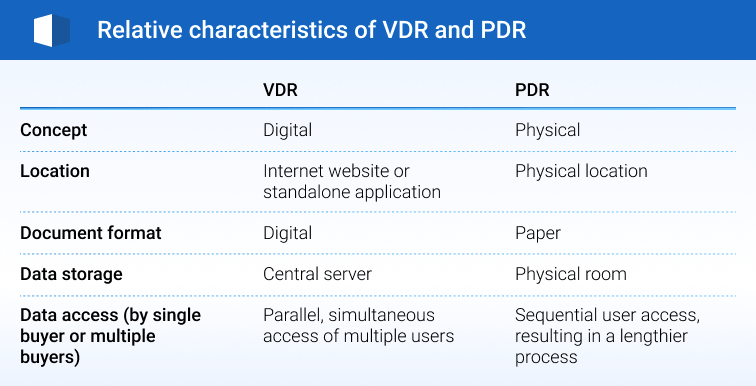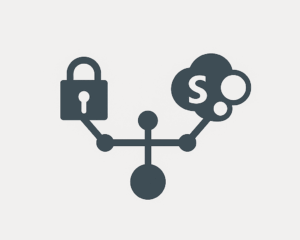

Data rooms are spaces that can be used for storing data for security and future reference. They can be physical data rooms, virtual data rooms, or data centers.
A variety of information can be stored in data rooms, ranging from highly sensitive information to confidential business transactions to materials for legal investigations, and much more.
What is a physical data room?
A physical data room, as the name implies, is a physical location or space set up by a seller or an organization to store important documents that are required during a merger and acquisition (M&A). This data room is accessible to both the buyer and the seller before making a deal.
The buyer will need to have as much information as possible about the company being purchased before closing the deal. It is, therefore, necessary for the seller to store the required documents in a secured and monitored central location to restrict access to unauthorized personnel.
If it’s a large transaction involving many buyers, the seller will require that all buyers have access to the data room throughout the process. This is one of the reasons for the evolution of virtual data rooms because when the transaction involves a large number of buyers, the seller will be required to host them all, and this incurs more costs.
Many sellers are moving to virtual data rooms to reduce costs and time spent on physical documentation. With virtual data rooms, both buyers and sellers can access the information needed wherever they are, and it is less expensive than the physical data room.

What is a virtual data room?
A virtual data room is an online way of storing, securing, and sharing information. Only those who are given specific user permission can access the virtual data room through an internet connection. It fast-tracks the M&A process as potential buyers can access all the information they need through an internet connection whenever it’s convenient.
Virtual data room services ensure secure data storage for companies and organizations. It is more cost-effective, allows for better time management, and is easily accessible.
Check the best data room solutions

The evolution of data rooms to virtual data rooms
With the 21st century came a need to evolve to find a better way of doing things. Virtual data rooms are the next generation of data rooms. Here’s why:
- Physical data rooms (PDRs) are time-consuming.
The preparation of a physical data room for due diligence meant a lot of hard work. Digging up documents and making several copies for different files and teams was time-consuming. More so, buyer due diligence teams had to wait their turn to use the data room.
- Using PDRs is cost-ineffective.
From the seller’s end to the buyer’s end, PDRs meant more costs for everything from transportation to accommodations and other logistical arrangements for the due diligence teams. There was a need for something more effective.
- Work has gone digital, so should PDRs.
If data from physical data rooms had to be discussed via emails and processed using spreadsheets, and other analytical tools, then it only made sense that the entire process should go digital for more efficiency.
The early data rooms were physical rooms or structures inside companies where important paperwork was stored. A logbook was used to record everyone who entered the data room due to the sensitive nature of the information.
Physical data rooms were often clunky, full of papers, and expensive to run and maintain. They were not user-friendly, so as a need arose to improve data rooms, they evolved into internet-based data rooms.
What are the advantages of VDRs over physical data rooms?
On-demand access
This is one of the major advantages that virtual data rooms have over physical data rooms. You get to access the documents and any information whenever it’s convenient. The documents can be viewed by anyone who has authorized access and an internet connection. Virtual data rooms allow better access to the right people from any registered device.
Safety and security
VDRs are safe ways of storing data and information. You do not need to worry about missing a single document from a larger set or the data being stolen by competitors who might copy or edit the files.
Reduced paperwork
With virtual data rooms, there is less paperwork to carry around. It reduces the stress of arranging paper documents and maintaining them each time they’re needed.
Restricted access
When using a VDR, companies can give access only to authorized personnel without worrying about just anyone viewing the files. It helps to secure the integrity of highly confidential documents.
Cost-efficiency
The use of a VDR reduces the cost needed to maintain paper documents. All you need to access virtual data files is an internet connection, but with physical data rooms, you need to travel to where the documents are stored.
Scalability
A virtual data room provides seamless data access no matter how much data is being shared. Unlike physical data rooms, where you need to manipulate a spreadsheet that has limitations on how much data can be shared.
How and where virtual data rooms are used?
Mergers and Acquisition (M&A)
M&A is the most popular use of virtual data rooms. M&As require a lot of confidential documentation, and buyers need access to them as part of the due diligence. Virtual data rooms make it easy for buyers to access the information needed about the company they’re acquiring without having to travel from one location to the other.
Preparing a virtual data room for mergers and acquisitions is a simple process. It is easy for the buyer to review the documents and also for the seller to exchange documents with as many potential buyers as needed. Virtual data rooms make the review process less expensive, quicker, and easier. The buyer does not need to handle large stacks of paperwork or fly in multiple experts to scrutinize and review the documents.
Initial Public Offering (IPO)
When a company is issuing an IPO, a large amount of paperwork is required as investment bankers, attorneys, and other involved parties are expected to sign and verify the documents. Using virtual data room for Initial Public Offering ensures the security of the documents, and access can be restricted to only authorized personnel. It can also help the company secure data from competitors who might copy or edit the documents. It also reduces the stress of arranging paper documents.
Court proceedings
Court proceedings usually involve a large number of highly confidential documents. The use of virtual data rooms allow attorneys and other involved parties to access the documents remotely without worrying about carrying a large number of documents or that the documents will go missing or get stolen.
A VDR is also effective when a case involves international teams. All teams can access the documents from a secured online space without having to travel. The viewing of highly sensitive documents can also be restricted.
Corporate repository
Companies can set up a virtual data room when they have employees in multiple locations. The data room acts as a private cloud where employees can view required data and documents from anywhere with an internet connection. Employers can also share data in the VDR and give access to all employees. It is an effective way of passing information to employees without the fear of losing documents.
The use of a VDR in companies reduces the number of paper documents floating around. It also provides easy access or referral to documents whenever they’re needed.
Strategic partnerships
Business partners can give each other access to important documents. They can also set permissions to give access to whomever they like while still being able and monitor who has access to it. It enables partners to work together to access and verify documents even without being in the same location.
Consultancy
A consulting business requires confidentiality and privacy regarding client information. Carrying paperwork around cannot guarantee the security and privacy as well as a VDR. With a VDR, you can be certain of the privacy of your information and documents.
Technology
The bigger user of VDRs is the technology industry. A VDR allows tech firms to share information among teams across different locations to enhance the spread of ideas within the company.
Virtual data room providers
There are various VDRs providers, and each offers different features; and therefore, pricing plans vary. Most data room providers offer free trial periods. You can take advantage of those to choose the best solution for your business or organization.
References
- Apr, 2020. “What Is A Data Room?” By Editorial Staff. Incorporated.Zone. https://incorporated.zone/what-is-a-data-room/
- “Data Room – a secure place that is used to store privileged data”. CFI Education Inc. https://corporatefinanceinstitute.com/resources/knowledge/deals/data-room/
Recommended for you


